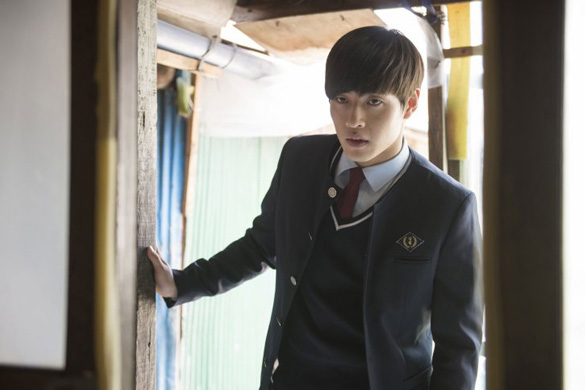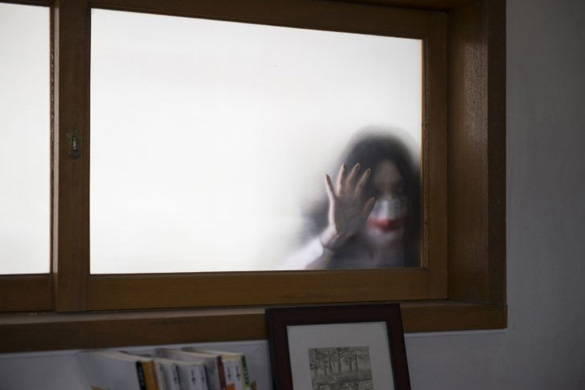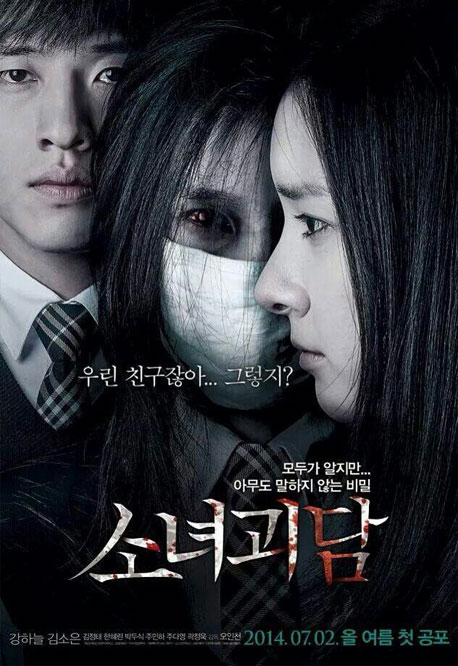"I know you can see me! Are you going to keep acting like this? Wow! You're totally ignoring me!
Do you think I'm talking to you because I like you? I'm bored and I've no other choice but to speak to you!
But I won't ask you to relieve any grudges..."
Synopsis:
In-su (Kang Ha-neul) has seen ghosts since he was a young child; or, more accurately, he has been constantly hounded by the dead demanding his help to relieve their grudges and enable them to move to the 'other side'. Having lived and studied in the US for a number of years, In-su has recently returned to his hometown and enrolled in high school determined to find a balance between settling in and keeping a low enough profile to avoid drawing undue attention to his special 'gift' - or as he sees it, curse - but the dead clearly have other ideas and before long he finds himself being repeatedly visited by a the ghost of a pretty schoolgirl (Kim So-eun) who cannot remember even her own name. When In-su's attempts to ignore her - in the hope that she'll get bored and go away - cut no ice, he reluctantly acquiesces to her demands for conversation and (almost before he realises) the two begin to form a close bond.
However, the discovery that ‘The Mask’ - a malevolent, vengeful and deeply twisted spirit with demonic eyes, heavy make-up and ‘hacked’ hair who wears an air/surgical mask over her mouth - is, sequentially, brutally murdering In-su’s classmates leaves him desperately trying to find a way to put an end to her killing spree at the same time as attempting to uncover how and why his sweet, gentle ghost friend died..
Review:
If you were to choose a diehard Korean film fan at random and ask them what narrative subjects/arcs and tropes almost constitute 'classic' K-horror, they would likely look at you somewhat strangely for having the sheer audacity to ask them to cherry pick from the myriad of elements that would undoubtedly increase exponentially as they continued to cite their choices. However, one might almost think that director Oh In-chun and writer Lee Jong-ho have done exactly that and more in combining so many requisite elements within a single narrative to ensure that 'Mourning Grave' feels utterly classic from start to finish:
The very first scene in ‘Mourning Grave’, showing In-su travelling on a tube train while having a phone conversation with his mother, not only instantly underlines his utter abhorrence at being continually accosted by ghosts - his unease initially appearing to be because of a loudly aggressive female in the same carriage - but also both deftly references future narrative threads that will be given full context in due course (as and when required) and sets up the ‘classic’ feel for the majority of the film, as a whole. In-su in his short phone conversation mentions both his uncle and another character called A-young resulting in the feeling, when we are finally introduced to their individual stories in full, that we are being told about people of whom we are already aware in some shape or form. This trend continues throughout the narrative - from the early bullying on the train of In-su by schoolchildren and the fact that he is far more preoccupied by the thought of ghosts being near than in his detractors’ goading; to the ghost girl's shock, in an early meeting with In-su, at his reluctance to help a boy being bullied "for no reason" (later shown to be related both to her past and events yet to unfold); to the first visual, and aural, reference to character Sung-hee’s dog and its demise; to the first mention of ‘The Mask’ by name; and so on – largely serving to make specific thread explanations in dialogue and flashbacks appear as natural context extensions rather than exposition, per se; even though exposition is essentially what each is, at its core.
The ghosts/spectres/spirits present (so to speak) in ‘Mourning Grave’ - aside from the gentle girl ghost whom In-su befriends (and, yes, my choice to not specifically give her character's name here is deliberate) – in the main bear a noticeable resemblance to those seen in a great many Asian, and by extension Korean, horror movies at around the time of the Korean New wave; the first two especially (the long-haired ghost on the train with her requisite unsettling, unnatural neck/body movements; and the young, speechless, blue/white faced boy staring up at In-su in a playground at night as In-su tells his uncle that he’s moving in with him) being hugely reminiscent of the vengeful spirits in Takashi Shimizu’s ‘Ju-on: The Grudge’ (2002 / Japan). So much so, in fact, that to my mind they appear as a deliberate (and respectful) homage by director Oh In-chun to some of the most famous Asian horrors from over the years and whether the physicality of each in this instance was specifically chosen to give ‘Mourning Grave’ a ‘classic horror’ feel or not, that’s exactly what they combine to do. It could even be said that ‘The Mask’ herself screams classic Asian horror, too, though by the time she appears in earnest that feeling has already been resolutely and perfectly set, regardless of if Asian horror cinema in general has been brought to your mind or specific Korean New wave films such as the Ghost School series and the like.
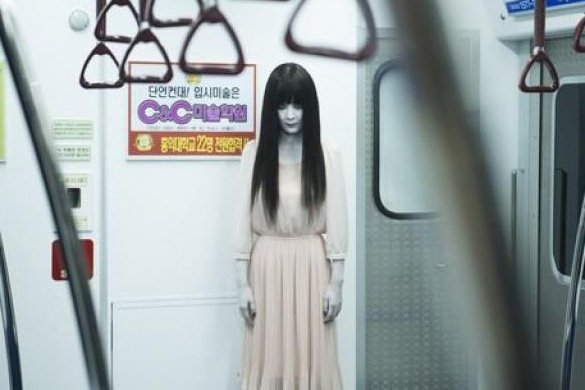 |
There was a time when such easily recognisable, even iconic, depictions of spectres in Asian films were so prevalent as to consistently feel overused but even though their like has appeared (to an extent) on occasion in more recent Korean films since the New Wave - such as 2008's Death Bell, for example - I honestly believe that the time of thinking "Another long-haired ghost?" has long gone and as such ‘Mourning Grave’ easily succeeded in making me feel as I did when I saw such malevolent spirits on the screen for the first time, all those years ago.
Of course, the use of such 'horror archetype' figures has an extra, bonus plus side on top of all the above: They are inherently creepy (both in physical appearance/movement and by cinematic association) meaning ‘Mourning Grave’ 'delivers the goods' (if you will) in its frightfest efforts far more than the majority of Korean horror movies of the last few years.
Those who have seen Oh In-chun's 2012 horror short 'Metamorphoses' will already be aware of the director's passion for the horror genre and his adeptness at infusing bloody and violent narratives with dark, witty and genuinely funny humour. However, in 'Mourning Grave' he deftly takes things further by adding an almost romance - and indeed romantic melodrama - sub-plot to proceedings in the burgeoning relationship between In-su and his ghostly female friend; thereby being able to create the (again utterly classic) narrative genre merging of 'Love, Loss and Laughter' elements that have been almost requisite to Korean cinema as a whole, over the years.
As such, as far as I'm concerned, all of the above combines with 'Mourning Grave's critique of the Korean school system (another ever prevalent and often present cinematic subject matter seen and dissected in numerous K-horror film 'classics' since the New Wave) - as well as its violent undertones and even instances of suicides among stressed and bullied students - to ensure that 'Mourning Grave' can both easily stand alongside long vaulted examples of Korean horror at its best and even hold its head high in conversations about Korean cinema as a whole.
{As a side note: I gave a talk at the Asian Exposure symposium at Coventry University in 2011 on the subject of 'Love, Loss and Laughter in Korean Cinema'. If you'd like to read more of my thoughts on the importance to Korean films of genre merging and the combining of romance, melodrama and comedy, you can read the full transcription of the lecture at:
http://www.hangulcelluloid.com/essays.html#asianexposure}
The humour in 'Mourning Grave' is largely centred around In-su's uncle, Seon-il (Kim Jeong-tae) - a man who can also see ghosts and has been agoraphobic ever since being (supposedly) possessed by a female spirit who forced him into a women's bath house where he was subsequently discovered - and school student Hae-cheol (Park Doo-sik) - a pompous bully who considers himself the coolest of the cool but who is in reality a bit of an ass - and the fact that 'Mourning Grave' allows viewers to smile (and, in the case of Hae-cheol, laugh at a bully which to my mind we always should) in the midst of murderous horror is one of the film's many strong points.
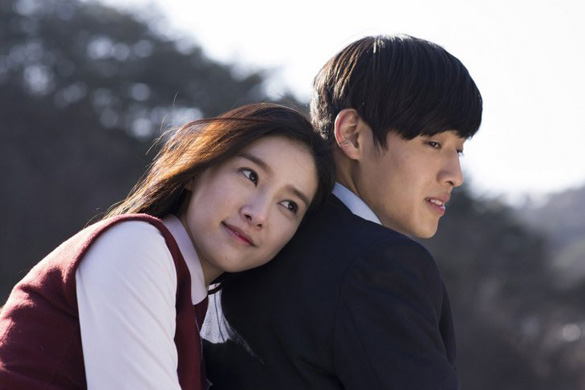 |
However, for me - aside from the horror tale itself - the most memorable narrative thread is the relationship between In-su and his ghostly female friend. As gently sweet and warmly engaging as any romance should be (a gorgeous little scene, for example, immediately comes to mind in which the pretty ghost girl teases In-su, watching him draw a picture of her at home while using her ability to disappear to constantly keep out of his direct sight - even though he knows she's there... somewhere - and even jokingly sticking her tongue out at him when he tries catch her), becoming genuinely moving as it inevitably edges towards melodrama, here we have the 'never can be' love of a couple who in a different life could well have been destined to be together.
This (almost) romance is of course endearing in its own right but the great performances of Kang Ha-neul as In-su and Kim So-eun as the pretty ghost boost its engagement greatly - the two young actors having a noticeable chemistry adding to each other's portrayals through the entire film - and, of these, Kim So-eun deserves even more credit as a result of the sheer breadth of emotions required by her role(s). It has been said that as 'Mourning Grave' was to be her first feature film project (having previously starred only in television series) Kim So-eun hesitated over whether or not to take the role. I for one am so glad she chose to be involved and I honestly hope this is the first project in a long film career for the talented actress.
Within the critique of the school system in 'Mourning Grave', there is even thematically the raising of the question of how guilty bystanders (those aware of injustices who turn a blind eye, whether from a lack of caring or their fear of their own persecution) may be for not taking a stand against the bullying taking place - even asking if they are/were perhaps in some way also to blame for the death of out (now) ghost heroine - and Oh In-chun perfectly brings this idea together with the aformentioned warm romance (and the sweetness with which he noticably imbues the ghost girl's character/personality) to highlight how easily a beautiful life can be pointlessly decimated by the heartless actions, or lack thereof, of others.
In a nutshell, considering the slump that Korean horror has seen in recent years and the genre's often lacklustre output, 'Mourning Grave' successfully combines horror, humour, romance and thought provoking themes to deftly and almost effortlessly redress the balance to quite a degree.
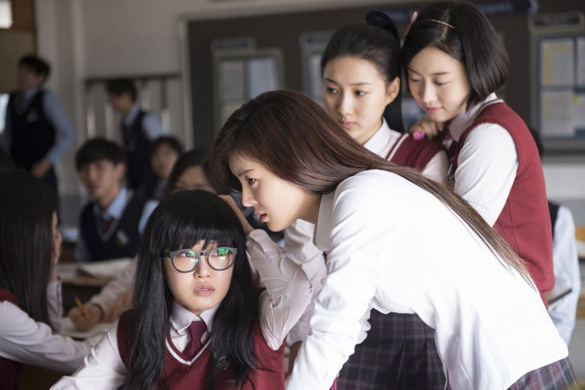 |
Cinematically, ‘Mourning Grave' is exemplary; everything and more that you'd expect from a horror genre film. Pacing is brisk but never rushed with (somewhat) romantic and comedic scenes used to give a natural speed ebb and flow in conjunction with the faster horror sequences. Likewise, in terms of camerawork director Oh In-chun switches between steady, anchored and longer shots to handheld with frenetic cutting as and when the narrative requires. Plus points should also be given for the intelligent decision to both keep the majority of the horror scenes in darkened surrounding as well as deliberately refraining from dwelling on the ghostly imagery present. That goes for the murders, too, with a number of (especially female) characters' final scenes played out behind closed doors, as it were, with a single piercing scream heralding the end of 'the end'. Less is more, as they (whoever 'they' are) say, and Oh In-chun clearly understands that the imagination can be far more evocative and chilling than any overlong, gratuitous, visual brutality.
Musical Direction (by Clarice Eun-hae Ok) also adds greatly to the atmospherics of 'Mourning Grave': Used sparsely and largely kept to the horror and romance moments, the music serves to place viewers in the required frame of mind using musical motifs - a sweet piano melody with subsequent accompanying sweeping strings heralding the ongoing and burgeoning relationship between In-su and his ghostly friend; a wooden xylophone playing high register notes and almost dissonant repetitions (sounding rather like a child's 'demented' musical toy) morphing into almost ear-splitting, piercing tones mixed with jarring and grating sounds for the darkest segments - to allow the film to move between genres without any fear of viewer confusion. All the while, dialogue scenes requiring no aural accompaniment are wisely left well alone, in the process making the music when it does appear all the more important and memorable.
Finally,you can read the Hangul Celluloid 2011 interview with director Oh In-chun (prior to him becoming involved in 'Mourning Grave') at:
http://www.hangulcelluloid.com/inchunohinterview.html
Summary:
With 'Mourning Grave', director Oh In-chun uses his experience of blending horror and humour (as seen in his 2012 short 'Metamorphoses') and extends it to also include romance and melodrama; thereby ensuring that this horror/comedy/romance fulfils the almost requisite Korean cinema merging of love, loss and laughter elements in a single narrative. Feeling utterly classic from the first frame to the last, 'Mourning Grave' is frankly one of the best Korean horror films of the past few years.
'Mourning Grave' (소녀괴담) / 2014 / directed by Oh In-chun
Cast: Kang Ha-neul, Kim So-eun, Park Doo-sik, Kim Jeong-tae, Han Hye-rin, Joo Min-ha
|


